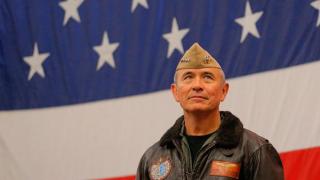Rumors that tough-talking US Pacific Command chief, Admiral Harry Harris, is being considered as President Trump’s ambassador to Australia captivated policy thinkers and Asia watchers last week. His appointment would likely sharpen US-Australia attention on Asia’s deepening strategic challenges, but there’s a long road ahead before he secures the nomination.
Admiral Harris knows Australia’s strategic community extremely well and is highly respected by both sides of politics. Foreign Minister Julie Bishop told Sky News she would welcome his appointment as a “capable, competent man who knows Australia well,” while Kim Beazley agreed that he would be “a very good choice”.
One of the reasons for this approval is that Harris is an astute diplomat. While he holds strong views opposing Chinese coercion in the South China Sea, Harris is very aware of the political sensitivities in the Australian debate surrounding our relations with both the United States and China. He has remained carefully neutral on questions of Australian foreign policy during several recent visits, including over Canberra’s hesitation about joining freedom-of-navigation operations and its related concerns about Chinese economic coercion.
Harris has been a champion of a US-Australia alliance that refocuses on Asia-related challenges and opportunities. He has been at the forefront of the “Indo-Asia-Pacific” concept in the United States, which many Australian strategists regard as the correct strategic framework for America’s Asia policy. He has also advocated greater US-India collaboration and supported the reemergence of a strategic “Quad” between the United States, India, Japan, and Australia.
Beijing will inevitably be angered by Harris’ rumoured appointment and will have already made its opposition known in the halls of Australian policy. But this must not be allowed to deter Washington and Canberra from pursuing their candidate of choice.
His consideration for the ambassadorship should be interpreted in this context. It is a sign that key players in the Trump administration – and America’s defence establishment more generally – are eager to see a trusted Asia strategy expert appointed to this position. Given the dearth of Asia hands in the administration so far, Harris’ possible appointment is viewed internally as a welcome corrective – despite the fact that an Australian ambassadorship is not the best position for an Asia policy specialist.
It’s true that Harris takes a tougher line on China than many Australian political leaders. While he advocates “peaceful cooperation” with Beijing within the bounds of Asia’s existing rules and norms, he is a leading voice on the need to push-back against Chinese maritime assertiveness, accept more strategic risk, and deter Beijing by strengthening US military power in Asia.
As ambassador to Australia he would likely to keep working towards greater US-Australia strategic coordination and military interoperability, including with other US Asian allies and partners, particularly around building a collective response to Chinese coercion and political and geoeconomic influence.
Beijing will inevitably be angered by Harris’ rumoured appointment and will have already made its opposition known in the halls of Australian policy. But this must not be allowed to deter Washington and Canberra from pursuing their candidate of choice. Canberra will, however, need to fight the perception that any new or more robust measures it takes against China in maritime Asia are the product of Harris’ influence, rather than that of Australian deliberations.
Finally, just because Harris’ name has been floated, it doesn’t mean he will receive White House backing. US ambassadors not only head up their respective diplomatic missions. They also serve as the president’s direct political representive. As Pacific Command has a larger voice in this White House than in the previous administration, it is possible he will win President Trump’s blessing. This would signal that Admiral Harris enjoys strong ties to the State Department and White House staff, and has an outsized role to play in managing US-Australia relations.






